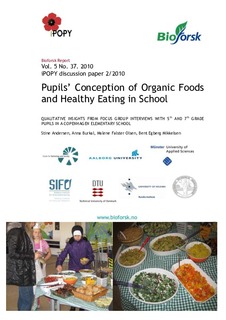| dc.description.abstract | Adult habits, including unhealthy eating patterns, are largely established during a person´s childhood and early youth. In this connection, public schools are important health promoting platforms due to their potential for encouraging interest, knowledge and learning about health related issues. The main aim of the study was to shed light on primary and lower secondary school pupils´ everyday experience with food, nutrition, ecology and health in connection to public organic school food, using the municipality of Copenhagen as a case. We have examined how a procurement and provision strategy that primarily originates from “backstage agents” such as engaged politicians and civil servants and governed by administrative priorities, is perceived among agents at the front stage arena - the school. Furthermore we have investigated to which degree the pupils experience a connection between the “organicness” of the food program and the underlying organic supply chain principles, and to which degree the pupils experience a connection between the “organicness” of the food program and classroom initiatives in subjects related to ecology and health. In February 2008, we approached a public school which proved willing to participate in our study. Subsequently, over a period of four weeks, we designed an interview guide used to conduct focus group interviews with pupils from grades 5 and 7, which were then transcribed. In general, pupils were very interested in ecology as a subject. However it seems that they do not see a very strong connection between the healthy, organic meals offered at school and class room activities related to health and ecology. The pupils did not feel that they had been involved in the decision to establish organic and healthy food procurement. As a result they held that they did not feel very committed or engaged in the school provision initiative, and the organic and healthy food procurement was not highly sought after on the part of the pupils. This appears to justify a distinction between the perspective that front stage actors have, including pupils, and the perspective of politicians and planners that operate back stage. The distance between these two stages, which tends to increase in large scale municipal school food systems, is an important challenge to address when planning school food interventions.
There seems to be a potential for linking organic school food service more closely with curricular activities, and for linking issues of healthier eating and organic food supply. There is also a need for greater involvement of the pupils and other front stage actors when the food service system and food related curricular activities are planned. | nb_NO |
